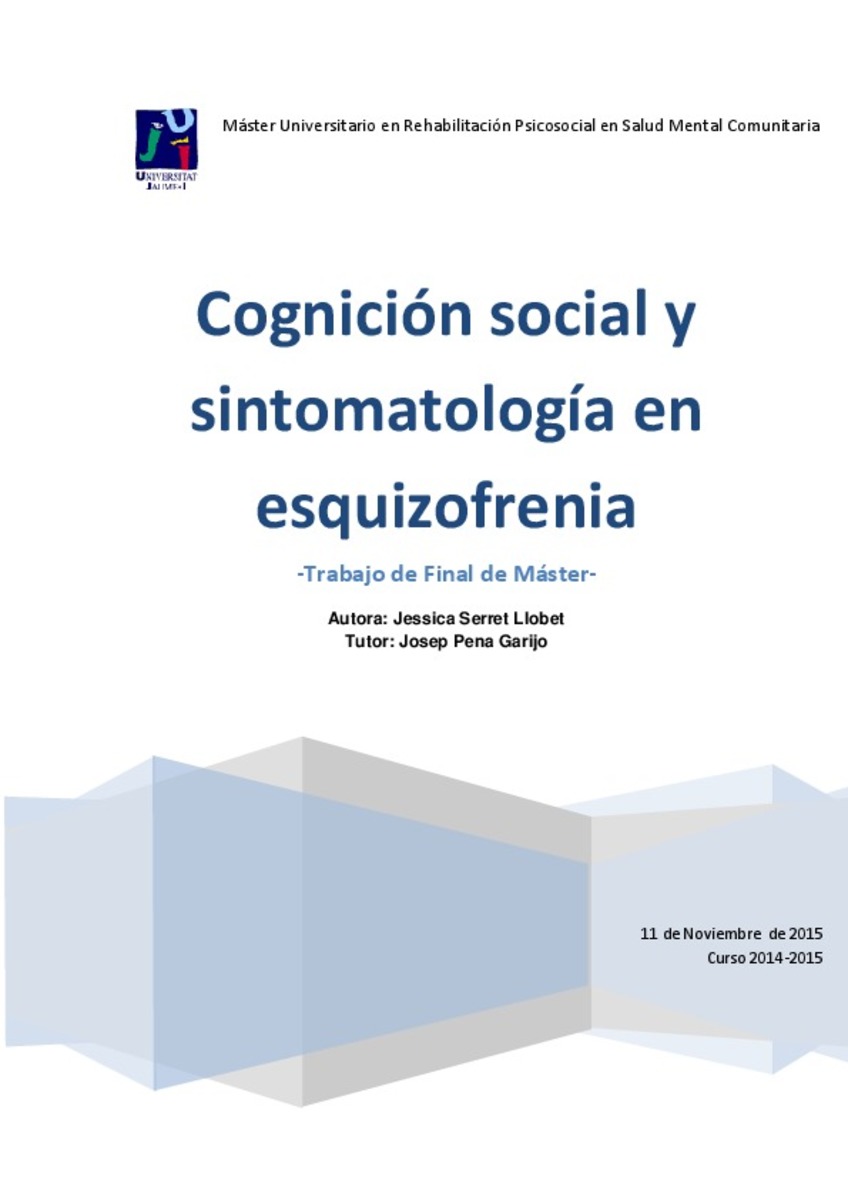Mostrar el registro sencillo del ítem
Cognición social y sintomatología en esquizofrenia
| dc.contributor | Pena Garijo, Josep | |
| dc.contributor.author | Serret Llobet, Jéssica | |
| dc.contributor.other | Universitat Jaume I. Departament de Psicologia Bàsica, Clínica i Psicobiologia | |
| dc.date.accessioned | 2016-01-14T08:21:12Z | |
| dc.date.available | 2016-01-14T08:21:12Z | |
| dc.date.issued | 2015-11-11 | |
| dc.identifier.uri | http://hdl.handle.net/10234/145085 | |
| dc.description | Treball final de Màster Universitari en Rehabilitació Psicosocial en Salut Mental Comunitària. Codi: SAX014. Curs acadèmic 2014-2015 | ca_CA |
| dc.description.abstract | Introducción: En las dos últimas décadas hay un interés creciente en el estudio de la cognición social en pacientes con esquizofrenia. La cognición social se define como las operaciones mentales que subyacen a las interacciones sociales. La evidencia empírica relaciona la cognición social con el funcionamiento social, su papel como variable mediadora entre la cognición social básica o neurocognición y el funcionamiento social y la atención que se ha dado y se está dando al desarrollo de programas de intervención en esquizofrenia centrados en la cognición social. La cognición social incluye cuatro dominios: reconocimiento de emociones, teoría de la mente, estilo atribucional y percepción y conocimiento social. Material y métodos: El estudio se desarrolló con una muestra de 8 pacientes a los que se pretendía evaluar la relación existente entre sintomatología del espectro psicótico y tres dimensiones de la cognición social: reconocimiento de emociones, teoría de la mente y estilo atribucional. Resultados: Resultó estadísticamente significativa la relación entre la puntuación de la PANSS y reconocimiento emocional y estilo atribucional. También fue significativa la puntuación obtenida en la Prueba de Reconocimiento de Evaluación de Emociones y años de evolución de la enfermedad. Conclusión: En trabajo se demostró que hay una relación clara entre la gravedad de la sintomatología psicótica y dos dominios de la cognición social (reconocimiento de emociones y estilo atribucional). Relación que se viene demostrando en los últimos años en la literatura y que demuestra la importancia de realizar intervenciones en este ámbito para la recuperación integral del paciente. | ca_CA |
| dc.description.abstract | Introduction: Over the past two decades there has been a growing interest in the study of social cognition in patients with schizophrenia. Social cognition is defined as the mental operations underlying social interactions. The empirical evidence linking cognitive social with social functioning, her role as intermediary variable between social cognition or neurocognition and social functioning, and the attention that it has been given to the development of intervention programmes focused on schizophrenia social cognition. Social cognition includes four domains: recognition of emotions, theory of mind, attributional style and perception and social knowledge. Material and methods: The study was conducted with a sample of 8 patients which were aimed to assess the connection between psychotic symptoms and three domains of social cognition: recognition of emotions, theory of mind, attributional style. Results: It turned out statistically significant the connection between PANSS and emotional recognition and attributional style. Also significant was the score on the Test of Emotion Recognition and evaluation and years of disease progression. Conclusion: This study showed that there is a clear connection between the gravity of psychotic symptoms and two domains of social cognition (recognition of emotions and attributional style). A connection in recent years in the literature and which proves the importance of interventions in this area for the full recovery of the patient. | ca_CA |
| dc.format.extent | 20, 15 p. | ca_CA |
| dc.format.mimetype | application/pdf | ca_CA |
| dc.language.iso | spa | ca_CA |
| dc.publisher | Universitat Jaume I | ca_CA |
| dc.rights | Attribution-ShareAlike 4.0 Spain | * |
| dc.rights.uri | http://creativecommons.org/licenses/by-sa/4.0/ | * |
| dc.subject | Màster Universitari en Rehabilitació Psicosocial en Salut Mental Comunitària | ca_CA |
| dc.subject | Máster Universitario en Rehabilitación Psicosocial en Salud Mental Comunitaria | ca_CA |
| dc.subject | Master's Degree in Psychosocial Rehabilitation in Community Mental Health | ca_CA |
| dc.subject | Esquizofrenia | ca_CA |
| dc.subject | Cognición social | ca_CA |
| dc.subject | Sintomatología | ca_CA |
| dc.subject | Estilo atribucional | ca_CA |
| dc.subject | Teoría de la mente | ca_CA |
| dc.subject | Reconocimiento de emociones | ca_CA |
| dc.subject | Schizophrenia | ca_CA |
| dc.subject | Social cognition | ca_CA |
| dc.subject | Attributional style | ca_CA |
| dc.subject | Theory of mind | ca_CA |
| dc.subject | Recognition of emotions | ca_CA |
| dc.title | Cognición social y sintomatología en esquizofrenia | ca_CA |
| dc.type | info:eu-repo/semantics/masterThesis | ca_CA |
| dc.educationLevel | Estudios de Postgrado | ca_CA |
| dc.rights.accessRights | info:eu-repo/semantics/openAccess | ca_CA |








